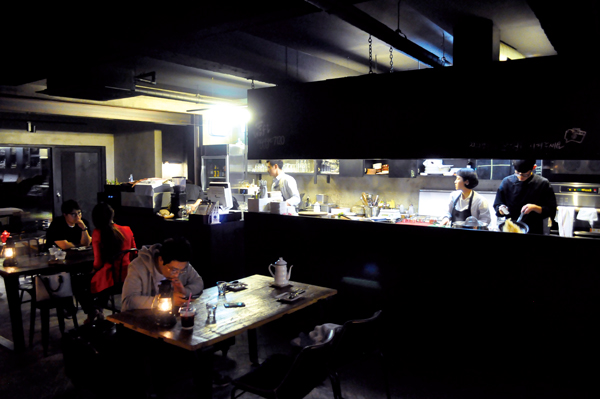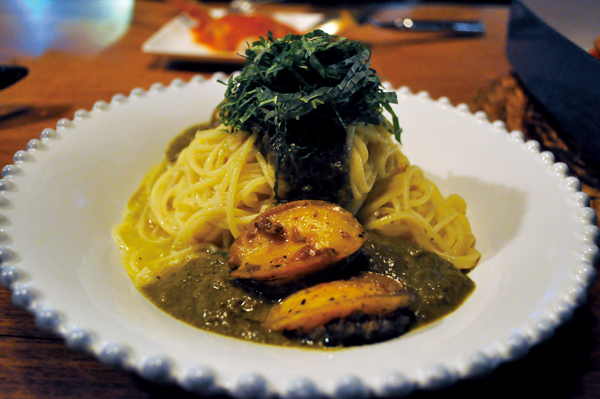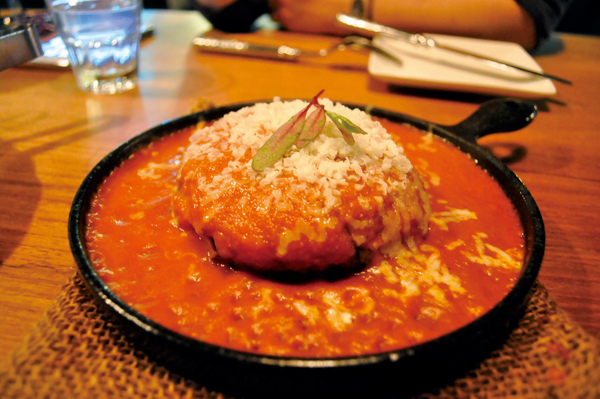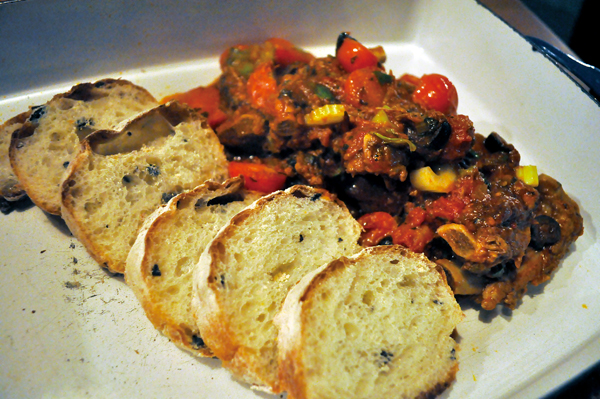| |
 |
|
| ▲ The kitchen and dining area of Hygge Photo by Justin Ferrell |
She softens when she finally sits down to tell her story. Behind the counter she was hard and intense; furious with concentration, her only thoughts of the fire. Frying, boiling, scalding and stewing - a profusion of cooking arrayed in front of her as waves of heat poured out of an oven behind.
Choi Soo-young started Hygge in August of 2014 after feeling dissatisfied as both a housewife and an author of a travel/camping book. She found meaning in cuisine and the business of food. She also loves the natural beauty of Jeju.
Hygge (pronounced “who-guh”) is a Danish word meaning comfort or well-being. This single term is the infrastructure upon which her entire cooking philosophy is based.
Chef Choi won my respect with her desire to impact people’s lives. She felt that there’s more to eating out than just a transaction of money for food. Hygge is as much about heart as it is about appetite; as much about the season and soil as it is about passion and people. Chef Choi wants her meals to be as interpersonally nourishing as they are wholesome for the body.
| |
 |
|
| ▲ The abalone and spaghetti (전복 게우 파스타) Photo by Justin Ferrell |
Drawing inspiration from the New Danish Cuisine movement, chef Choi is deeply concerned with local ingredients, simplicity of preparation, and the importance of fresh, seasonal foods.
She bends every recipe to her unyielding belief that each ingredient is itself a flavor that deserves to be appreciated. Rather than depending on salt, spices, and sauces alone, Choi wants the people who eat her food to savor the inherent qualities of the eggplant, tomatoes, abalone, and pork that she so carefully selects.
It’s been a steep learning curve, and not without its twists and turns. Tourists and locals alike tend to resist subtlety, and a business must conform to the wants and needs of the customer. Pasta was one such compromise. She now has spaghetti. Her original menu adhered to more traditional Danish recipes.
Her current menu includes in-house breads, cheeses, potatoes, open sandwiches, steaks, meatballs, soups, salads, and plenty of wines to choose from.
The abalone and spaghetti was my favorite dish (전복 게우 파스타). The sparse green sauce was bursting with flavor. I couldn’t identify the spices used in its preparation. Reminiscent of pesto, but seemingly devoid of basil, it was nevertheless robust enough to make each mouthful flavorful and rich. And although the abalone was meaty and generously sized, I would have liked a couple more medallions than I got.
The “Snow Cheese” (스노우 치즈) was a large puck of grilled eggplant and fresh mozzarella in the center of a thin pool of tomato sauce. The presentation was enticing, and the taste of the eggplant was superb. The sauce, however, lacked depth, and trying to wrangle mozzarella out of the pan was like wrestling with napalm spider webs. Delicious, but molten and adhesive.
| |
 |
|
| ▲ “Snow Cheese” (스노우 치즈) Photo by Justin Ferrell |
Lastly, the tomato and pork ribs (토마토 등갈비) was a fusion of Korean and Italian influences. The meat was both tender and wet. The cherry tomato sauce adorning the ribs was thick - full of black olives, celery and a wealth of fresh herbs.
Overall, the meal was satisfying. Smart jazz, elegant lighting, and an accomplished interior decor added a great deal to my dining experience. The staff of six was attentive, if not somewhat aloof. Seating ranged from stuffed chairs around coffee tables, standard tables for two or four, up to a single large table that could seat eight.
Hygge is quite remote, but in my opinion worth the drive if you are ready to spend a little extra on an elegant atmosphere at the edge of the ocean. Outdoor dining is available, weather permitting.
Hygge
MAP
66 Hagwi 2-gil, Aewol-eup
Jeju-si, Jeju-do
064-712-7120
| |
 |
|
| ▲ Tomato and pork ribs (토마토 등갈비) Photo by Justin Ferrell |
|























